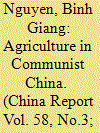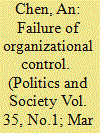|
|
|
Sort Order |
|
|
|
Items / Page
|
|
|
|
|
|
|
| Srl | Item |
| 1 |
ID:
186833


|
|
|
|
|
| Summary/Abstract |
This article examines the Communist Party of China’s (CPC) policies toward agriculture from an institutional perspective. Mao Zedong viewed the peasantry as allies of the CPC, and in order to socialise rural areas, he ordered massive collectivisation, attempting to manage the countryside and peasants with people’s communes and production brigades. Deng Xiaoping and Jiang Zemin responded to the dysfunction that followed with reforms and opening up, including the abolition of collectives and people’s communes, liberalising agriculture, and promoting incentives for labour. This led to its own complications, and efforts later by Hu Jintao and Xi Jinping have been directed towards resolving the ‘three rural issues’ – of agriculture, rural areas, and farmers – in order to achieve a ‘moderately prosperous society’ and the ‘great rejuvenation of the Chinese nation’. This article argues that while there is an emphasis on innovative policies and approaches, there is a lack of structural reforms owing to the CPC’s wish to remain in control of rural areas and peasant life.
|
|
|
|
|
|
|
|
|
|
|
|
|
|
|
|
| 2 |
ID:
077226


|
|
|
|
|
| Publication |
2007.
|
| Summary/Abstract |
As frequent, violent, and organized peasant protests show, China's reform regime has lost its once all-powerful control in the countryside. The sharp decline of village cadres' positional authority in allocating economic resources, which began in post-Mao decollectivization, holds the key to explaining the change. Since the late 1990s, the collapse of village enterprises and the erosion of power over land have cost village cadres their remaining economic levers to engage the villagers as well as their incentives to work for the party-state. The loss of the regime's grip on village cadres and the loss of command by village cadres on peasants have almost synchronized, causing the traditional structure of organizational control to crumble in vast rural areas. In the new, prevailing patterns of village governance, party power is becoming increasingly irrelevant
|
|
|
|
|
|
|
|
|
|
|
|
|
|
|
|
| 3 |
ID:
178770


|
|
|
|
|
| Summary/Abstract |
This article examines the contradictory outcomes of China’s rural reform since 1978. It traces four periods of rural reform policies through cyclical rounds of policy implementation, structural transformations, and economic, social, and environmental outcomes. The analysis reveals that contradictory outcomes are embedded within conflicting goals framing rural reform policies, specifically goals to modernize China’s rural regions and fair resource allocation among its inhabitants. In addition, the Chinese central government has repeatedly resorted to a top-down, campaign-style approach, creating conflicting objectives between short-term quota fulfillment and sustainable structural adjustment policies. The research suggests that the socio-environmental contradictions emerging from rural transformations in China must be viewed within the global political economic context that favors growth oriented, efficiency-based development strategies.
|
|
|
|
|
|
|
|
|
|
|
|
|
|
|
|
|
|
|
|
|